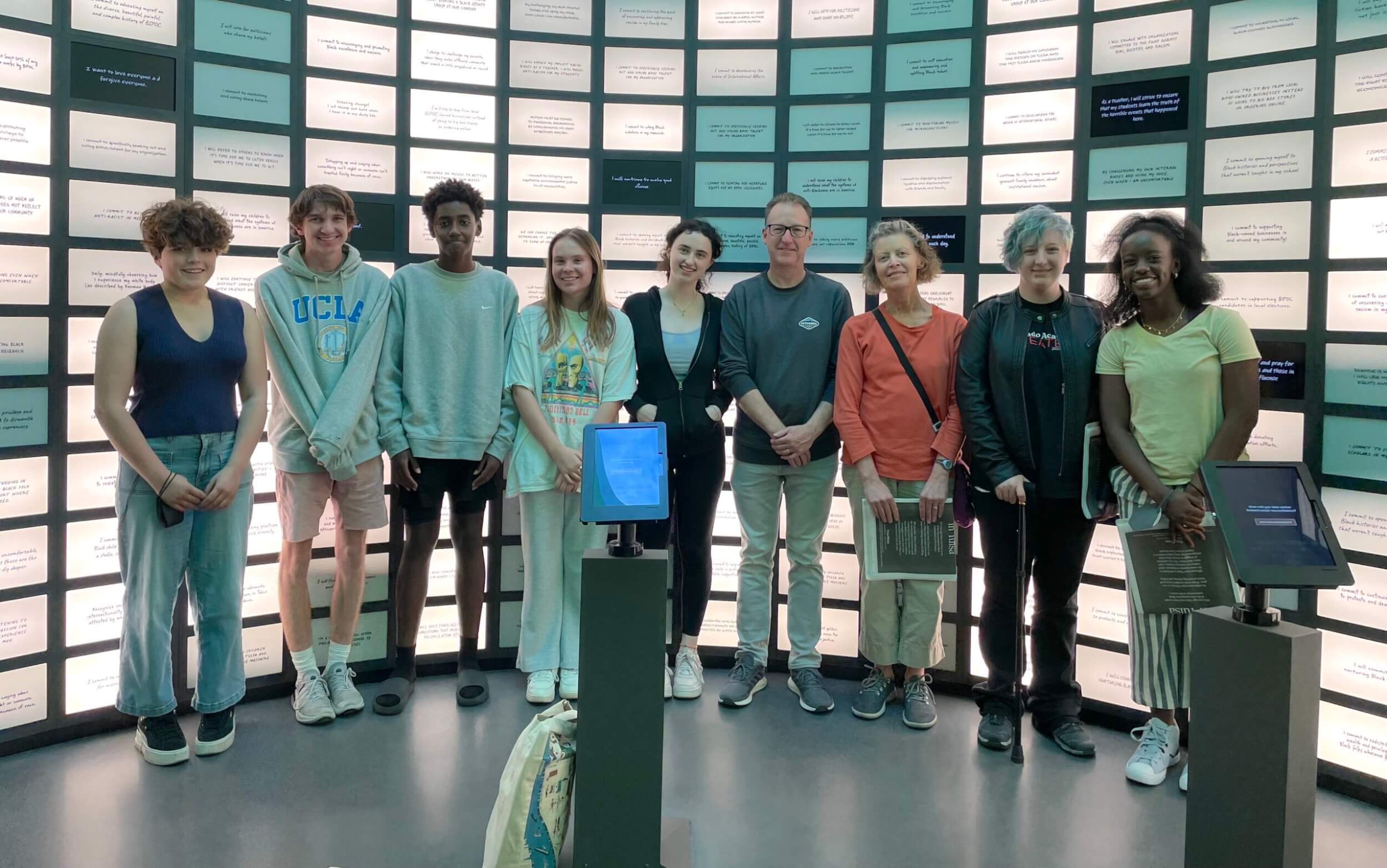How do we write about history, even when it is painful? Or when others might prefer to look away or even deny what happened? Can fiction somehow tell the “truth” better than a traditional historical account? Those are some of the key issues Senegalese author Boubacar Boris Diop grappled with as he set out to write his most famous novel, Murambi: The Book of Bones, which depicts the genocide committed against the Tutsi people in Rwanda in 1994. The success of that effort earned Diop the prestigious Neustadt Literary Prize, endowed by the Neustadt family and sponsored by the journal World Literature Today.
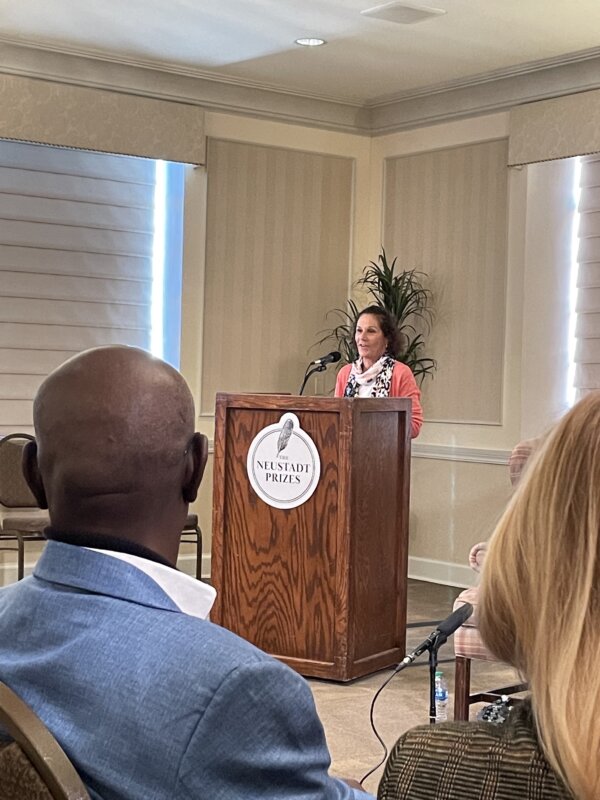
As this year’s winner, Diop traveled to the University of Oklahoma last week to accept his prize and discuss this book and his career as a journalist, teacher, playwright, and novelist. A group of Colorado Academy students and teachers were fortunate enough to be there as well, supported by a generous gift by CA parent Kathy Neustadt, mother of Tess Hankin ’16 and Josh Hankin ’19. Neustadt and her two sisters are the administrators of the Neustadt Prize, as well as the NSK Neustadt Prize for Children’s and Young Adult Literature—both founded and endowed by the Neustadt family—and Kathy Neustadt’s gift has enabled CA students and teachers to travel to Oklahoma annually for more than a decade to attend the prize festivals.
A book like Murambi is one for posterity, as several academics noted at the conference. If anything, the book has gained in power and influence since it was originally released in 2000. Diop’s more recent novels are written in Wolof, the native language of Senegal, not French—part of his project of re-centering Africa’s native languages instead of relying on the languages of the colonizers. In his presence, we came to better understand the recent history of African oppression and the ways in which, even today, many Africans are looking to “decolonize their minds” in order to build a better future for themselves and their home countries.
A few weeks ago, I wrote about this annual trip to the Neustadt Literary Festival. Students were selected to attend, based on the successful submission of a personal narrative based on a Diop essay called “My Father’s Library.” Now that the CA contingent of seven students and two teachers has returned, I want to report about it and share some of the many highlights of the experience.
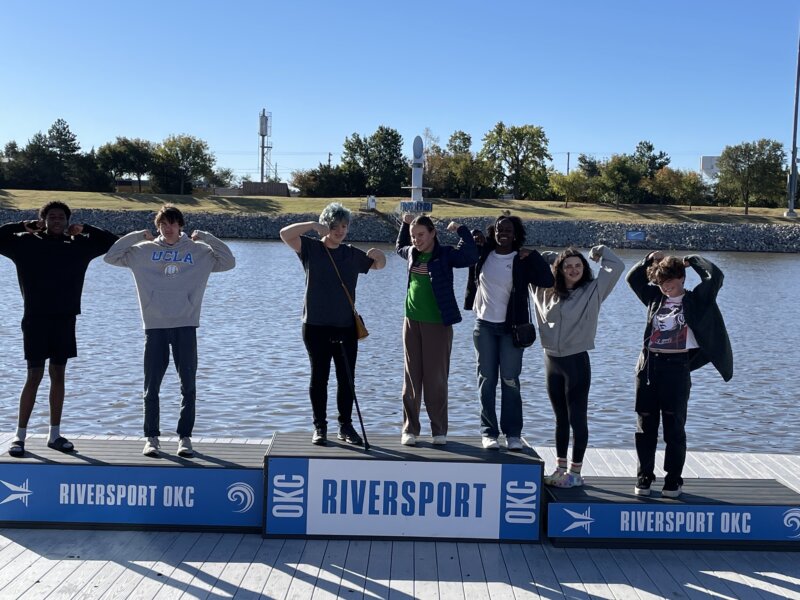
Our group of four Seniors, three Sophomores, and two faculty members left Denver on Sunday, October 23, headed first for Tulsa, Okla., before going to the University’s main campus in Norman, about 20 miles from Oklahoma City.
Why start in Tulsa? In its spring 2021 issue, World Literature Today, a quarterly journal that has been housed at OU since 1927, commemorated the 100-year anniversary of the Tulsa Massacre, breaking from its usual focus on the prose and poetry of other nations to tell the story of something that happened 100 miles from its office. Inspired by this issue and my own increasing interest in the Tulsa story, I decided to add a day of exploration in that city. So the group made its way to Greenwood Rising, a new museum that exists on the very grounds where the massacre occurred. I won’t recount all the details of that fateful day in history, but suffice it to say the museum does a fine job of putting Greenwood into its proper historical context, relating what led up to the massacre, as well as how the community rebuilt in the subsequent years. (Just last year, the New York Times published a detailed, interactive account of what happened; scholarly work is ongoing.)
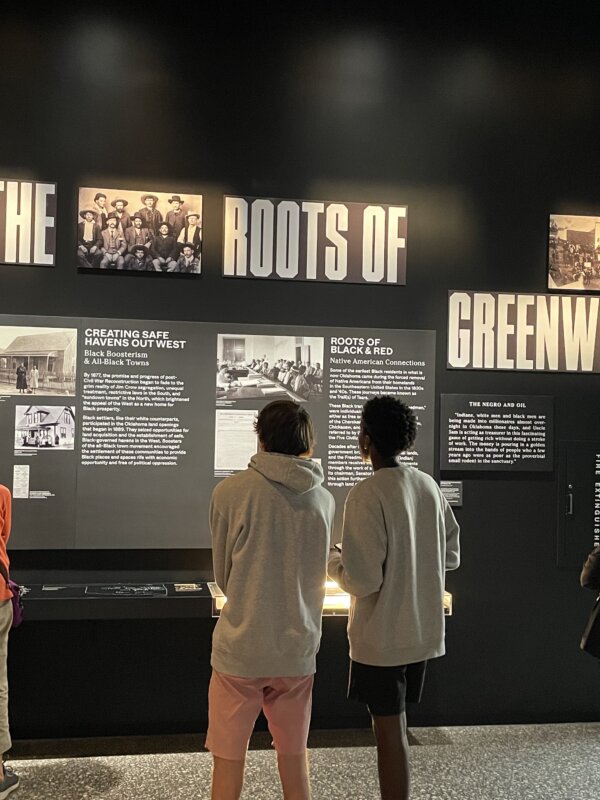
In Tulsa, we were also able to enjoy one of the most beautiful, interactive urban parks I have seen in this country: the Gathering Place. After a heavy experience at Greenwood Rising, the students appreciated being able to literally run off some steam at the park.
The next day we headed from Tulsa to Norman in a driving rainstorm. Once we made it to the campus of the University of Oklahoma, the rain subsided, and we enjoyed walking around the connected town area. We then headed to the first in a series of roundtable discussions, presentations, and guest lectures pertaining to Diop’s work. Our students paid close attention and distinguished themselves by taking the microphone before the assembled guests and college-level academics and asking astute questions.
That night, we enjoyed what proved to be the highlight of our three days in the Norman/ Oklahoma City area. At a local pizza and pasta place, we were fortunate enough to have dinner with Diop, thanks to the assistance of RC Davis-Undiano, the longtime Neustadt Professor and Executive Director of World Literature Today at OU. Each of the seven students introduced themselves and posed questions to the 76-year-old author, who thoughtfully answered and interacted with the students. (Also on hand that night was a film crew shooting a documentary about Diop, so CA may find itself featured in the final cut.) Of that experience, Senior Sofia Meltzer noted that she “felt a deep, newfound appreciation for African literature,” while Sophomore Caleb Mengistu valued Diop’s explanation about “the complexity of the solution to advancing African culture.”
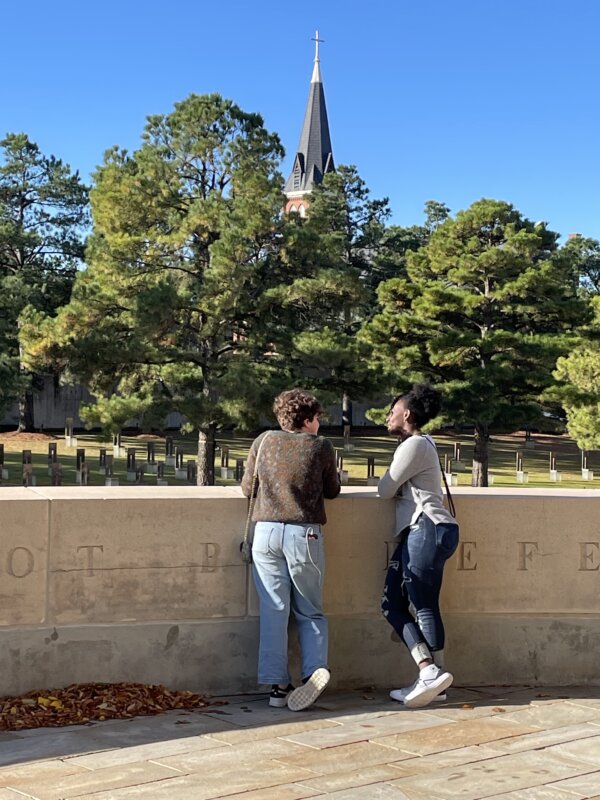
Other activities during the three days included visiting the Oklahoma City Bombing memorial site, which is a beautiful and somber tribute to the victims of that act of domestic terrorism in 1994. Most of the students had only a vague knowledge of what happened, so it was an excellent opportunity for them to learn some recent history and to understand one of the nation’s most extreme cases of anti-government action. While on campus, we also explored the university’s library and art museum, both of which are world-class facilities. Scanning the endless stacks of volumes at the Bizzell Memorial Library, Sophomore Aziza Diallo was “amazed how knowledge and PhDs’ [theses] have been preserved from years and decades ago.” At the Fred Jones museum, a special exhibit on synesthesia and a sculpture that reminded us of another one at Denver International Airport marked a meaningful tour.
As is customary, one of the components of the Neustadt Literary Festival is the announcement of next year’s prize winner. The NSK Neustadt Prize for Children’s and Young Adult Literature is given in alternating years with the Neustadt International Prize. Kathy Neustadt herself announced the winner, and I was personally thrilled to hear that it was Gene Luen Yang, known to many teachers and students already as the author of American Born Chinese, a graphic novel that has been featured in our Ninth Grade Coming of Age in the World class for several years. Yang is also the author of Boxers and Saints, Dragon Hoops, and Superman Smashes the Klan, all of which are beautifully drawn and written. I also appreciate Yang because, up until just two years ago, he was still a full-time math and computer science teacher at Bishop O’Dowd High School in Oakland, Calif.! The dates for next year’s festival, at which Yang will be the honored guest, are already set for October 23-25, 2023, and we will once again take a group of CA students and teachers to the event.
Many thanks to the Neustadt Family Foundation for the generous support of this incredible program, as well as to RC Davis-Undiano and Daniel Simon at World Literature Today. Our connection to the Neustadt awards and the university broadens students’ view of the world and extends our academic goals, as well as our DEI efforts, in measurable ways. We look forward to our twelfth year of partnership next fall.
